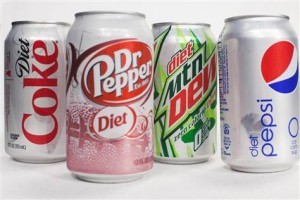Diet Pop and Glucose Metabolism
This past weekend we had a birthday party for our daughter Olivia. And as with many parties like this there was food, cake and drinks.
[caption id="attachment_4341" align="aligncenter" width="300"] What healthy people drink, right?
Because we're all trying to do the best we can with our health we have diet pop as an offering. And I'm sure many of you are the same. If you drink pop you probably opt for the diet version, right? Not many health conscious people are buying regular Coke or Pepsi when they do the grocery shopping.
So why do we choose diet pop? Well I guess it has to do with the fact that we don't want empty calories. I mean if I'm going to eat or drink something I better be getting some kind of nutritional benefit from it such as protein, healthy fat, vitamins, minerals, hydration etc. Regular pop offers virtually none of these but does have a dose of sugar, carbonation and is acidic.
But besides avoiding the extra calories by drinking diet pop the other reason to avoid it was for the fact it wouldn't alter our blood sugar levels. In other words we didn't have to be concerned with the connection to type II diabetes and other metabolic disorders.
Until now.
A new study in the journal Nature found that consuming an artificial sweetener may impair glucose metabolism similar to that seen in type II diabetics.

In the study researchers fed mice and humans one of three treatments, glucose, saccharin (the artificial sweetener) or glucose. You may be familiar with saccharin as the sweetener in Sweet N Low. Anyways, only the group fed saccharin showed altered glucose metabolism.
So what is taking place that is accounting for this altered glucose metabolism? Well it appears that the mice and people fed saccharin showed changes to their gut bacteria. Previously it was thought that the artificial sweeteners passed through the gut undigested.
To test out whether the bacteria were effected by the saccharin researchers would give antibiotics to the mice and normal glucose metabolism was restored. And on the flip side when the gut microbes of mice fed saccharin were transplanted to normal mice, the normal mice developed impaired glucose metabolism.
Is it that these particular bacteria thrive on saccharin? Or are they outcompeting neighbouring bacteria? Or is it something in the sweetener that kills the other (healthy) bacteria?
Only further research will answer these questions for certain.
In the meantime the take home message is to realize that diet pop is no longer the guilt-free, health-free treat maybe we were hoping it to be. It appears there may be a difference in the gut flora of lean versus obese people explaining why the same result won't be expected for everyone.
If you enjoy a diet pop from time to time you're going to be fine. However it's important to know that there may be consequences and it isn't the perfect beverage for those with glucose metabolism issues already such as diabetics.
Cheers,
Chris [fb-like]
When you subscribe to the blog, we will send you an e-mail when there are new updates on the site so you wouldn't miss them.

Comments 1
Guest - Jen
(website) on Tuesday, 23 September 2014 20:07
This is very interesting as always Chris. Hope it can help me break my husband of his diet Dr. Pepper habit!!